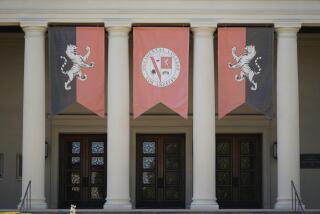Occidental Petroleum Near Sale of Stake in China Mine : Energy: The loss-plagued venture was launched in 1985 after personal negotiations with Deng Xiaoping.
- Share via
BEIJING — Occidental Petroleum Corp. appears to have reached an agreement with Chinese partners on its withdrawal from a trouble-plagued multimillion-dollar coal mine venture, a business observer in Beijing said today.
Occidental Chairman Ray R. Irani announced in January that the company wanted to sell its 25% share in the unprofitable $750 million An Tai Bao coal mine in Shanxi Province. Occidental’s initial investment of $175 million made the project, which was launched in 1985, one of the biggest and most famous joint ventures in China.
The company has yet to announce any details of its withdrawal, but reports circulating in Beijing indicate that last Friday, Occidental Executive Vice President John Dorgan signed an agreement concerning the pullout.
Company officials in Beijing and Los Angeles were unavailable or declined comment.
“The Occidental side is not saying a thing,” a Beijing-based business observer said today “They’re completely tight-lipped. But it seems to me that something was agreed to Friday. There was a signing ceremony (at the An Tai Bao office in Beijing) Friday at 5:30. It seems to me they reached some sort of an agreement on how to wrap this up.”
The open-pit An Tai Bao project was launched after personal negotiations between Occidental’s late chairman, Armand Hammer, and China’s senior leader Deng Xiaoping, who established a personal friendship.
At the time, many foreign observers were skeptical of the project, largely because of its massive size, inland location and the difficulties of running a joint venture in an industry still largely functioning under central planning.
Because the Occidental project is in many ways a special case, it is unclear what effect its withdrawal, and the terms of the pullout, will have on U.S. business perceptions of China’s investment climate.
“I think the (1985) deal was done because of the idea that Occidental’s big boss and China’s big boss were buddies, and that would solve any problems,” commented the business observer, who spoke on condition of anonymity. “That didn’t turn out to be the case.”
Since starting production in 1987, the project has been plagued by disputes with Chinese officials, transportation bottlenecks, shortages of diesel fuel and a drop in coal prices from $58 a ton when the feasibility study was done in 1982 to around $30 a ton for much of the period after the mine opened. Production at the mine remains below its capacity of 12 million tons a year.
It is unclear how much of its total investment, usually estimated at about $250 million, Occidental will be able to recover.
In the past, Occidental has said it lost $31 million on the venture last year.
More to Read
Inside the business of entertainment
The Wide Shot brings you news, analysis and insights on everything from streaming wars to production — and what it all means for the future.
You may occasionally receive promotional content from the Los Angeles Times.










